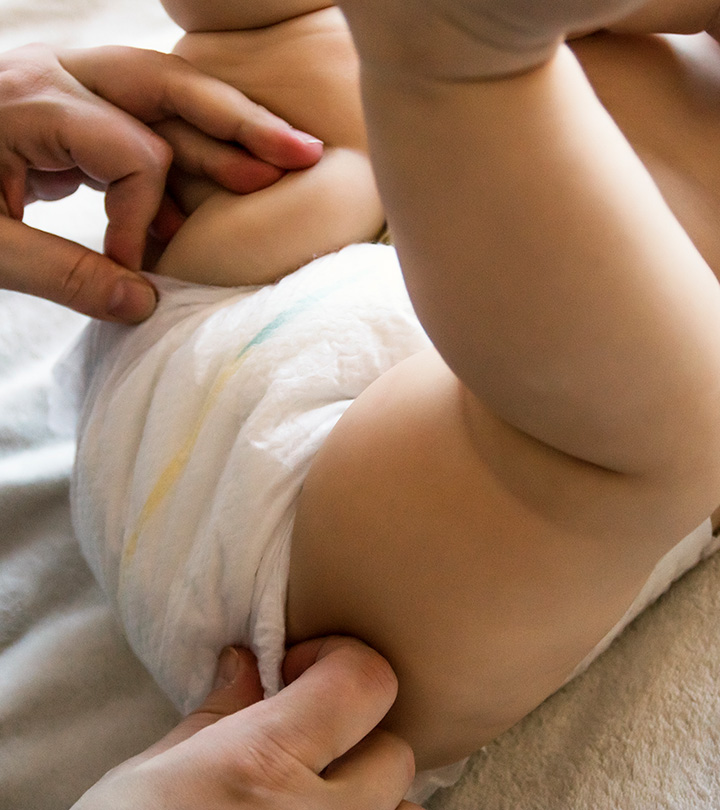A baby is constipated if they have difficulty passing stools or have hardened stools. A baby’s constipation may also lead to other issues, such as pain while passing stools and stomachache. Most infants younger than a year may go days without pooping. Knowing the symptoms to expect in a constipated baby may make it easier for you to differentiate regular stool motions from constipation (1) (2).
Read this post to know the causes, symptoms, treatment, and prevention for constipation in babies.
What Are The Signs Of A Baby’s Constipation?
The primary symptom of a baby’s constipation is hard and dry stools, which usually appear as individual lumps in the diaper. The baby may also show the following signs (1) (3).
- Strain while passing stool; evident from baby’s facial expressions
- Bloated belly due to gas accumulation
- Release of abdominal gas while passing stools
Severe constipation is less common and may lead to the following symptoms.
- Fecal impaction (hard and stuck stool)
- Encopresis (liquid stool around solid stool)
The reduced frequency of pooping may not always be an accurate indicator of constipation in babies, unlike constipation in children. Instead, focus on deviation from the usual pattern of pooping and the texture of the stools. Each infant has different pooping patterns, which are best known to the parents. If you notice changes in the baby’s pooping routine or diaper changes along with hard, lumpy stool, your baby may be constipated.
What Is The Normal Stool Frequency In Infants?
The normal stool frequency in a baby varies through the first year. Breastfed babies usually pass stools more frequently than those fed on formulas. Most newborns have one or two bowel movements in a day. This count may increase to five or ten per day during the first week of life. After that, the frequency may reduce as the baby grows old; they may have a stool frequency of one bowel movement a day or two by the time they become six weeks old (4).
Babies who have begun consuming solid foods may have fewer stools initially. However, the frequency sets back to normal once the gastrointestinal system adjusts to the solid food (5).
What Causes Constipation In Babies?
The following conditions may lead to a baby’s constipation (3) (6).
- Dehydration may cause constipation during warm weather.
- Unsuitable formula feed may cause constipation. Even a sudden switch to new formulas may cause temporary constipation.
- Imbalanced formula, such as adding too much powder to water during preparation.
- If a baby is being weaned, lack of fiber in solid food may cause constipation.
- A crack near the anus could make it painful for the baby to pass stools. Hence, they may refuse to poop, leading to constipation.
In rare cases, constipation in infants may occur due to the following underlying problems.
- Congenital anorectal malfunction (defects in the anus or rectum)
- Diabetes insipidus (a disorder where the body produces excess urine)
- Hypothyroidism (thyroid doesn’t produce enough hormones)
- Spinal cord abnormalities
- Hirschsprung’s disease (missing nerve cells in the colon)
- Cystic fibrosis (a condition where a few organs produce thick and sticky mucus)
- Gluten enteropathy or celiac disease (immune reaction to gluten); may be evident in babies on solids
How Is Constipation In Babies Diagnosed?
A pediatrician may usually diagnose a baby’s constipation through the following procedures (6) (7).
- Historical exam: This may include the baby’s medical history, feeding patterns, or past illnesses. The doctor may question stool frequency and symptoms. If your baby is on formula or solids, the doctor may ask about the type of formula or solid diet you feed your baby.
- Physical exam: The doctor may gently palpate the abdomen to check for any stiffness, swelling, or lumps. The doctor may also use a stethoscope to listen to the sounds in the baby’s abdomen.
Most babies can be diagnosed with constipation through these procedures. In rare cases, the doctor may suggest imaging tests (X-rays), blood tests, and urine tests, especially if the cause is suspected to be not related to diet and instead associated with some problem.
What Is The Treatment For Constipation In A Baby?
The following lifestyle changes may help treat constipation in babies (1) (8).
- Bath: A warm bath may help relax abdominal muscles and relieve any tightness.
- Exercise: Light physical activity, such as crawling and tummy time, may stimulate bowel movements. You may place younger babies on their back and bicycle their legs gently to provide assisted exercise.
- Massage: Gentle circular massage on the baby’s belly may help stimulate bowel movement.
- Hydrate: Ensure your baby is getting sufficient breast milk or formula. If the baby is older than six months, you may provide them with small amounts of water, especially if the weather is warm.
- Juices: The juice of certain fruits may work as a natural laxative. Prune juice is usually a popular remedy for constipation, including for babies younger than six months. You may give up to 30ml of homemade prune juice. You may read about how to make prune juice at home here.
- Formula alteration: Consider switching to another type or brand of formula if you suspect it to be constipation’s cause. Consult a pediatrician before changing the formula to ensure your baby gets the right formula milk for nourishment.
- Switch to high-fiber food: Babies on solids may be provided with high-fiber cereals, such as those made with whole wheat, barley, and oats. Other sources of fiber include vegetables, such as beans and broccoli, and fruits, such as apples and berries. Provide vegetables and fruits in steamed and mashed form so that the baby may get adequate fiber. Older babies may be served whole-grain porridges with finely chopped high-fiber fruits on top.
Never administer laxatives, enemas, or stool softeners to a baby unless suggested by a doctor. Avoid giving herbal remedies without first consulting the doctor. If the above tips do not work, the doctor may consider glycerin suppositories, which are gently inserted into the baby’s anal opening. Ask your doctor to tell you the correct use of suppositories.
When To Call A Doctor?
Consult a doctor if a formula-fed baby has not pooped for more than three days or a breastfed baby has not pooped for more than four days despite adequate feeding. You must also see a doctor if the baby’s constipation is accompanied by the following conditions (2).
- Blood in the stools
- Vomiting
- Loss of appetite
- Crying or pain while passing stool
- Drowsiness
- Colic or excess fussiness
Frequently Asked Questions
1. Can I give my baby gripe water to relieve constipation?
It is not known how does gripe water work. Nevertheless, it may contain certain herbs, such as dill and fennel, which are popular remedies for gastrointestinal troubles (9). Consult a doctor before giving gripe water for a baby’s constipation since different brands of gripe water have different ingredients.
2. Can I use coconut and castor oil to ease my baby’s constipation?
It is not known if oral administration of castor or coconut oil can safely treat constipation in babies. Hence, you must not use them to treat a baby’s constipation.
3. Are probiotics, such as yogurt, safe to use for infant constipation?
Probiotics include gut-friendly live microorganisms that help maintain a healthy gut environment. Research suggests that regular consumption of probiotics may improve stool frequency (10). Probiotic sources, such as yogurt and soy milk, are usually recommended for children older than 12 months. You may consult a doctor if you wish to try probiotics for babies younger than 12 months. You may read more about probiotics for babies here.
Constipation is a common occurrence in babies. If you are baby is feeding well and not in any pain or discomfort, you need not worry about constipation. The bowel movements of infants may change as per their age and diet. However, do not hesitate to take your pediatrician’s opinion. See a doctor soon if constipation is accompanied by other potential indicators of underlying problems, such as blood in the stools, vomiting, and poor appetite.
References:
MomJunction’s articles are written after analyzing the research works of expert authors and institutions. Our references consist of resources established by authorities in their respective fields. You can learn more about the authenticity of the information we present in our editorial policy.
The following two tabs change content below.



































